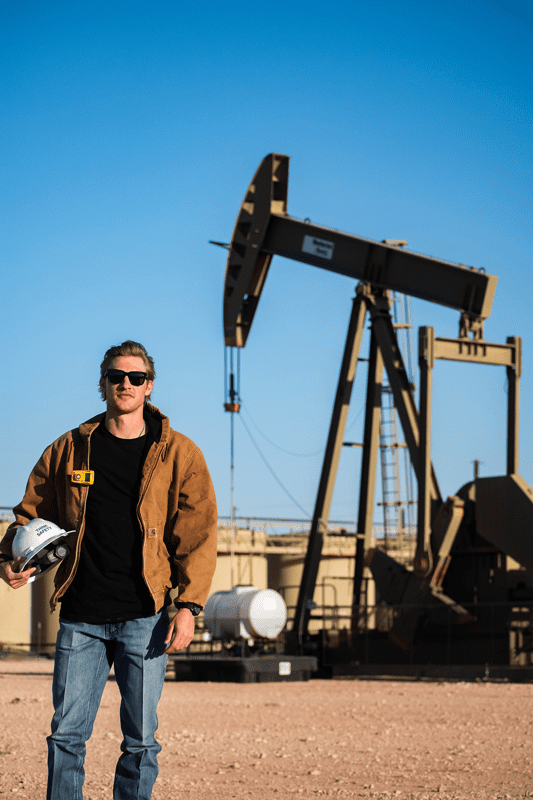For Connor Albrecht, landing a job in the vice-grip tight oil and gas labor market came down to simple doggedness and inventiveness.
After being pink slipped as a petroleum engineer earlier this year in the industry’s latest bust, Albrecht knew he needed to start some high-octane networking.
“I became more flexible than most, more persistent, more creative, more trusting in God’s plan and became an expert at networking and landing an interview without getting lost in the shuffle of applying online,” says Albrecht, referring to a well-known secret that about only one in four online applications is seen by a human.
Out of a job, the 27-year-old rented his Austin, Texas, home and headed west to rural New Mexico for employment after reaching out to an independent oil company executive. Now, he’s working on an operations/production engineering team overseeing operations of six wells and monitoring the batteries/facilities for daily maintenance and upkeep.
Albrecht says he went from flying in private planes to living in a man camp in the middle of nowhere within a couple of weeks. “During a recession of this magnitude, you have to be willing to relocate, take on another role and just be all around more flexible if you truly want to compete in this industry,” he says. “Wherever a company needs you, you have to be willing to move on a dime without thinking twice.”
After being in the oil and gas industry a few years, Albrecht says if a person isn’t willing to move every few years, the sector isn’t for them. “If you view many older and experienced petroleum engineers’ resumes, you will notice a trend of continuous relocation throughout their careers,” he observes.
His new employer, Ameredev, is a small, privately backed company, creating a jack-of-all-trades situation, an aspect Albrecht enjoys. Working for majors often pigeonholes employees in one job and they can’t branch out, he says.

Man Camp Livin’
With his “Reduction in Force” notice came some tough choices. After leasing his house to cover the mortgage and property, he headed west and ended up in the oilfields of Lea County, New Mexico, where the living conditions and landscape are far different than urban Austin.
“[I’m] currently living in an oilfield trailer park during my 14 days on,” he says. “I’ve been living out of a suitcase/homeless for the last few months…”
Albrecht says working in rural New Mexico got him away from all of Austin’s distractions. Now, he’s adopted a daily route of Bible study, where he’s writing down and answering a series of gratitude/purpose questions, journaling, reading and going to the gym. He keeps three journals: “Walk the Path,” where he pens his daily Bible study scriptures, and another labeled “YouTube University,” where he writes down what he learned from the online platform. The final one is “The Journey,” which is more of a memoir/chronicle of success filled with life lessons and triumphs.

Albrecht says living out of a suitcase for 14 days does have its advantages. “I have been traveling quite a bit on my days off to vacation, visit friends and family,” he says. The non-traditional work schedule allows him time to explore starting a side hustle in property management. In addition to his Austin house, he recently signed on another property to establish an Airbnb/short time rental in Nashville, Tennessee. “I plan to continue to keep monetizing and adding on units that will [create] cash flow; therefore, I do not have to rely on the volatility of the oil and gas industry in the long term.”
“A cool perk of my schedule is that I have the ability to take a [seven] day vacation every two weeks with a 14/7 schedule. Some people would kill to be able to take off [seven] days bi-weekly. But everything has a price and not everyone could manage working weekends to get there.”
However, Albrecht admits the remoteness of southeast New Mexico is hard at times, saying it’s his only dislike of the job. It’s tough mentally being in an isolated location with no chance to see friends and family for two weeks. It’s especially hard on the weekends when friends are out enjoying life and he’s working in the desert in the middle of nowhere.
His maturity has helped offset those feelings of isolation. “When I was straight out of college working for Haliburton in south Texas, I remember getting severe FOMO (fear of missing out); however, I have matured since then after going out nearly every weekend [while] working in Austin. It is much easier for me to work weekends now [knowing] I have been there and experienced the outdoor action and city nightlife.”

Not a Lifer?
While some in the oil and gas industry decide to take a severance package to relax or retire, Albrecht has decided on doggedness. “I took the initiative to find a job right out of the gate to make a double salary this year…to set me ahead of my peers financially and begin investing the capital in real estate and the stock market. I considered taking some time off and traveling the world; however, the pandemic didn’t encourage this. Therefore, instead of traveling, I got back to work pursuing my goals.” Albrecht adds that financial responsibility came at a young age when he opened his first Roth IRA account at 14 with earnings from mowing the lawns of friends, family and church members.
Albrecht, a Texas Tech University alum, recommends a similar path for some in the industry, but warns it’s not an avenue everyone should explore. “If you are single and don’t have kids, this would be a no brainer. Like I said, you must be flexible in the oil industry if you want to make it in the long term and succeed. This may be more difficult on the average family [person]; however, it is definitely doable, and people do it every day.”
To the thousands of oil and gas veterans who lost their positions during the pandemic, Albrecht has a bit of advice: Don’t go low, go high. Go to the top levels when applying for a job. “I have never gotten a job or interview by applying online. I go straight to the source which separates me from the rest of my peers.”
Photos courtesy of Melissa Pierce Photography
Instagram: https://www.instagram.com/melissapiercephotography
Facebook: https://www.facebook.com/melissapiercephotographynm
Dan Tyson has covered the energy industry for more than a decade, focusing mainly on coal and natural gas.





